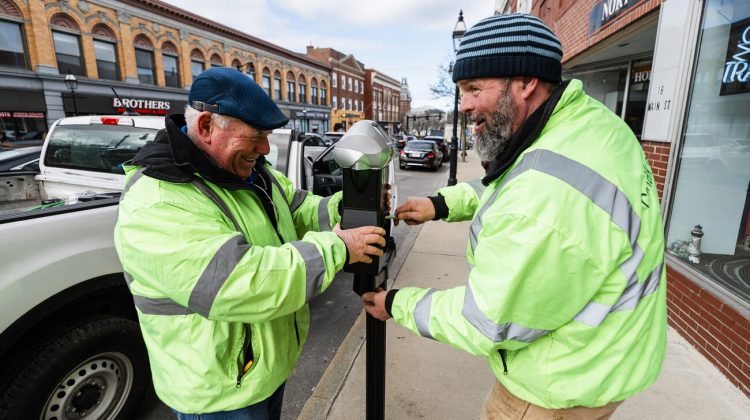Peabody residents can park for free in metered spots downtown until March 4 as the city continues to install new parking meters in the area ahead of their official debut next month.
The installation of the parking meters marks a key component of the city’s overhaul of its downtown parking ordinance, which was adopted by the City Council late last year. Along with the new meters, which accept coins, credit cards, and payment via a smartphone application called Park Smarter, the city has installed kiosks, electric-vehicle chargers, and LED lighting in the area.
The new system is a response to requests from businesses in the city’s downtown and visitors for more visible parking and expanded payment options, Mayor Ted Bettencourt’s office said in a statement.
“Downtown Peabody has undergone a dramatic resurgence in the past 10 years and become a hub of people and commerce,” Bettencourt said in the statement. “Upgrading our parking technology encourages more people to visit the many restaurants, shops, and attractions on Main Street and throughout downtown.”
The $1.5 million project is funded through a combination of state and local grants, Bettencourt’s office said.
The revitalization of downtown Peabody has been one of Bettencourt’s major priorities as mayor, an effort that has seen the opening of the North Shore Children’s Museum and Bell Inn and Tavern.
When the ordinance went before the council, members hailed its potential impact on the city.
“This is really supportive of a park-once approach that would have downtown patrons doing multiple things in their one trip to the downtown,” Ward 2 Councilor Peter McGinn said at the time.
Ward 3 Councilor Stephanie Peach, who has since been elected president of the council, said at the time that she supported the new ordinance and understood the importance of moving forward with the initiative. However, Peach raised several issues, most prominently with the establishment of an overnight parking ban in the municipal lots, which she feared could lead to additional drunk-driving accidents.
Councilor-at-Large Ryan Melville praised the ordinance and the project in general for its data-gathering potential.
“So much of what we talk about downtown is anecdotal,” he said. “I really do think that part of this is going to be analyzing the data we collect on this.”
“This is the step that needs to be taken to get to the point that we can actually start doing some of this,” Melville added.

